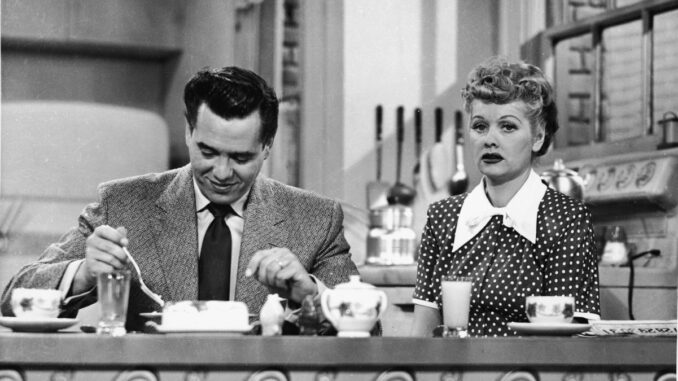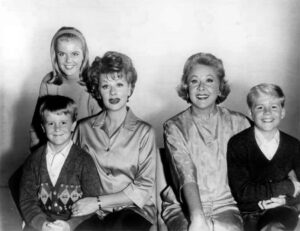
Introduction: A Family Perspective on Television History
When we think of classic TV, I Love Lucy stands tall as an unforgettable gem. With its slapstick comedy, lovable characters, and Lucille Ball’s undeniable charm, it’s no wonder the show captured millions of hearts. But behind the laughter, even the most devoted fans might not know that one significant change to the show didn’t sit well with Lucille Ball’s own daughter, Lucie Arnaz. Curious about what could cause such discontent? Let’s dive into the details of this family drama and explore how it shaped I Love Lucy’s legacy.
What Made ‘I Love Lucy’ a Cultural Phenomenon?
Before jumping into the controversy, it’s essential to understand the cultural powerhouse that was I Love Lucy. Premiering in 1951, the show revolutionized television with its innovative use of live audiences and multi-camera filming techniques. Lucy and Ricky Ricardo’s hilarious antics, combined with their genuine chemistry, kept viewers glued to their screens.
But as the show evolved, changes were inevitable—and not everyone appreciated them.
The Change That Sparked Controversy
One of the most significant shifts came when Lucille Ball and Desi Arnaz transitioned from I Love Lucy to a new format: The Lucy-Desi Comedy Hour. This series continued the adventures of Lucy and Ricky but adopted a different tone and structure. While many viewers embraced the change, Lucie Arnaz, Ball’s daughter, had a much less favorable opinion.
Lucie Arnaz’s Reaction: A Daughter’s Honest Critique
Lucie Arnaz was no stranger to her parents’ work. Growing up in the shadow of her famous parents, she was uniquely positioned to witness the inner workings of I Love Lucy. When The Lucy-Desi Comedy Hour debuted, Arnaz reportedly felt it lacked the spark and energy of the original series.
Why? According to Arnaz, the new format felt “too polished” and missed the authentic humor that made I Love Lucy so beloved. She lamented the absence of spontaneity, comparing the new episodes to an overly rehearsed stage play rather than the laugh-out-loud comedy her parents were known for.

What Changed in ‘The Lucy-Desi Comedy Hour’?
1. Episode Length
Instead of the tight, fast-paced 30-minute episodes of I Love Lucy, the new show expanded to a one-hour format. While this allowed for more elaborate plots, it sometimes made the stories feel stretched.
2. Guest Stars Took Center Stage
The original series thrived on the dynamic between Lucy, Ricky, Fred, and Ethel. However, The Lucy-Desi Comedy Hour heavily relied on guest stars like Bob Hope, Tallulah Bankhead, and Danny Thomas. While entertaining, this shift diluted the original chemistry that fans adored.
3. Less Focus on Everyday Humor
Part of I Love Lucy’s charm was its relatability. Lucy’s mishaps—whether stomping grapes in Italy or hawking Vitameatavegamin—were rooted in everyday life. The new series leaned more into glamorous, high-stakes scenarios, losing some of the grounded humor.
Why Did Lucille Ball and Desi Arnaz Make the Change?
Behind the scenes, the transition to The Lucy-Desi Comedy Hour wasn’t just about creative evolution. Ball and Arnaz faced mounting personal and professional pressures. By shifting to a less demanding production schedule, they aimed to balance their family lives with their careers. Ironically, this decision would later contribute to the breakdown of their marriage.
How Fans Reacted to the New Format
1. Mixed Reviews
While The Lucy-Desi Comedy Hour maintained strong viewership, fans and critics were divided. Some appreciated the extended format and big-name guest stars, while others missed the cozy, intimate feel of the original show.
2. Nostalgia for the Old Days
Longtime viewers often compared the new episodes to earlier seasons, favoring the simplicity and charm of Lucy and Ricky’s apartment over the lavish, guest-filled escapades.
Did the Change Impact the Show’s Legacy?
Despite Lucie Arnaz’s critique and mixed fan reactions, The Lucy-Desi Comedy Hour remains an important part of TV history. It showcased the duo’s versatility and paved the way for future sitcom evolutions. However, many agree that nothing could match the original magic of I Love Lucy.
Lucille Ball’s Take on Her Daughter’s Opinion
Interestingly, Lucille Ball herself acknowledged some of the shortcomings of the new format. In interviews, she admitted that balancing the comedy with high-profile guest stars was challenging. Yet, she remained proud of the work she and Arnaz accomplished.
What Can We Learn From This Story?
The reaction of Lucille Ball’s daughter reminds us of an essential truth: even iconic shows aren’t immune to critique. Whether it’s a creative shift or personal preference, everyone’s perspective adds to the richness of a show’s history.
Conclusion: A Legacy Worth Celebrating
While Lucie Arnaz may have initially disliked the changes to I Love Lucy, there’s no denying the enduring legacy of her parents’ work. The show continues to bring joy to audiences worldwide, proving that its charm is timeless. Whether you prefer the original series or the revamped format, one thing remains clear: Lucille Ball and Desi Arnaz left an indelible mark on television.
FAQs
1. Why did I Love Lucy change its format?
The change was primarily driven by Lucille Ball and Desi Arnaz’s desire for a more flexible production schedule to balance their personal and professional lives.
2. Did Lucille Ball agree with her daughter’s critique?
While Lucille Ball acknowledged the challenges of the new format, she remained proud of the work and the legacy it created.
3. How did The Lucy-Desi Comedy Hour differ from I Love Lucy?
The new series featured longer episodes, more guest stars, and less focus on everyday humor compared to the original sitcom.
4. What impact did Lucille Ball and Desi Arnaz’s personal lives have on the show?
Their personal struggles and eventual divorce added a layer of complexity to the production, influencing the show’s format and tone.
5. Is The Lucy-Desi Comedy Hour still worth watching?
Absolutely! While it’s different from I Love Lucy, it offers a fascinating glimpse into the evolution of the Ricardos’ story and showcases the duo’s versatility as performers.